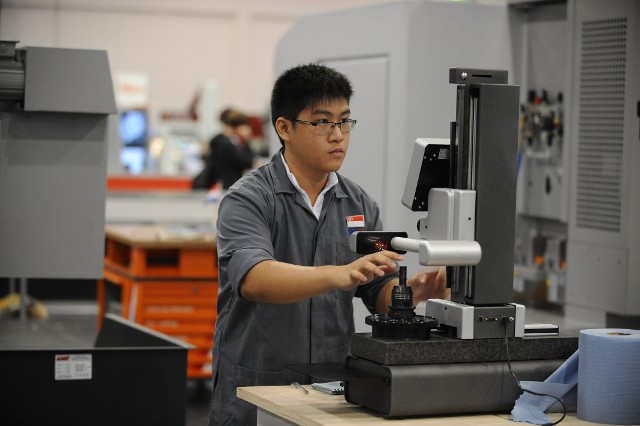Most people cannot imagine how important these technologies are in their lives. There is nothing that we use that hasnt in its manufacturing utilized CNC technology. It is present in products and objects of everyday life as e.g. cars, airplanes, components of machines of all types, moulds for tools used for household machines, medical prosthetics, cell phones and toys etc.
CNC milling machines are machine tools which are used for the shaping of metal and other solid materials. These machines exist in two basic forms: horizontal and vertical. This refers to the orientation of the cutting tool spindle. Early milling machines were manually or mechanically automated, but technological advances have led to the development of Computer Numerical Control, such as CNC machining centre. CNC refers to a computer (control) that reads and stores instructions. This numerical information generally G and M codes (a programing language) is then used to control and drives a machine tool, a powered mechanical device (machining centre). A machining centre is used to fabricate components using cutting tools for removal of material.
CNC technology includes machining tools such as lathes, multi-axis spindles, wire electrical discharge machines and milling machines, where the functions formerly performed by human operators are now performed by a computer control module. The professionals associated with this skill use CNC machines (3-Axis, 4-5 Axis or Multi-Axis machines) to cut and shape precision products as mentioned above. To form the finished part, the cutting process can be started from a solid block, pre-machined part, casting or forgings. For those scenarios, the skill requires the CNC milling machinist to read and interpret complex technical drawings and specifications and work to a high degree of precision and detail; to be proficient at metal work skills and understand how metals react to various processes; to be a skilled computer operator in order to use industry specific software; to be highly skilled machine operator. A program is required to operate the machine tool, can be generated manually or using Computer Aided Design/Computer Aided Manufacture (CAD/CAM) software.
To achieve the finished part the CNC milling machinist professionals undertake a sequence of essential activities:
– Interpret engineering drawings and follow the specifications
– Generate a process and program (logical process plan) with a CAD/CAM system and/or G and M-codes
– Set up the tooling, work holding device and work piece on the CNC milling centre
– Manipulate cutting conditions, based on the properties of the material and tooling used
– Operate, inspect and maintain the accuracy of dimensions within the specified tolerances
– Optimize the process taking into account the production type: large quantities of one part, small batches or one-of-a-kind items.
Today a wide range of industries require CNC milling machinists professionals to program, operate and keep sophisticated machining centres running in an efficient and reliable way. Large enterprises such as automobile plants, medium sized enterprises such as mould making and small enterprises in the maintenance field are some of many examples of where the CNC milling machinist professional plays a key, integral role to the success of the metalwork industries.
